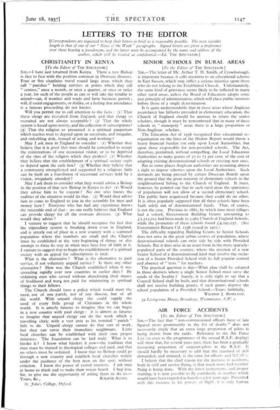CHRISTIANITY IN KENYA
LETTERS TO THE EDITOR [Correspondents are requested to keep their letters as brief as is reasonably possible. The most suitable length is that of one of our " News of the Week" paragraphs. Signed letters are given a preference over those bearing a pseudonym, and the latter must be accompanied by the name and address of the author, which will be treated as confidential.—Ed. THE SPECTATOR.] [To the Editor of THE SPECTATOR.] SIR,-1 have• just returned from Kenya. There a new Bishop is face to face with the position common in Overseas dioceses. Four or five chaplains travel round large areas which they call " parishes " holding services at points which they call " centres," once a month, or once a quarter, or once or twice a year, for such of the people as can or will take the trouble to attend—can, if weather and roads and farm business permit ; will, if social engagements, or dislike, or a feeling that attendance is a fatuous proceeding do not hinder.
Will you permit me to call attention to the facts : (s) That these clergy are recruited from England, and that clergy so recruited are not always acceptable ? (2) That the whole system is based upon money, and the collection of subscriptions? (3) That the religion so presented is a spiritual pauperism which teaches men to depend upon an uncertain, and irregular, and enfeebling dole, instead of acting and working ?
May I ask men in England to consider : (1) Whether they believe that it is good that men should be compelled to accept the ministrations of one occasional visitor, or to be deprived of the rites of the religion which they profess? (a) Whether they believe that the establishment of a spiritual society ought to depend upon the cash box? (3) Whether they believe that a community strengthened and supported by a religious faith can be built on a foundation of occasional services held by a visitor, irregularly attended ?
May I ask them to consider what they would advise a Bishop in the position of that new Bishop in Kenya to do? (I) Would they advise him to be content ? No one who knows the realities of the situation would do that. (2) Would they advise him to come to England to join in the scramble for men and money here ? Everyone who has had any experience knows the miserable end of that : no one really believes that England can provide clergy for all the overseas dioceses. (3) What would they advise ?
I venture to suggest that he should recognise the fact that the stipendiary system is breaking down even in England, and is utterly out of place in a new country with a scattered population where the numbers are small and the Church must be established at the very beginning of things or else attempt to force its way in when men have lost all faith in it. I venture to suggest that to begin the establishment of a spiritual society with an appeal for subscriptions is fatal.
What is the alternative ? What is the alternative to paid service, if not voluntary unpaid service ? Is there any other alternative ? How was the Church established when it was spreading rapidly over new countries in earlier days ? By ordaining men who served without abandoning their means of livelihood and were not paid for ministering in spiritual things to their fellows.
The Church should have a policy which would meet the need, not of one parish, nor of one diocese, but of all the world. With unpaid clergy she could supply the need of every little group of Christians in the whole world. It is utterly fatuous to imagine that we can begin in a new country with paid clergy : it is almost as fatuous to imagine that unpaid clergy can do the work which a travelling cleric with a vast area as his nominal parish " fails to do. Unpaid • clergy cannot do that sort of work, but they can serve their immediate neighbours. Little
local churches can be established with their own proper ministers. The foundation can be laid truly. What is to hinder it ? I know what hinders it now—the tradition that men must be trained in theological colleges and paid, and that no others must be ordained. I know that no Bishop could go through a new country and establish local churches widely under the guidance of the best men on the spot, without criticism. I know the power of vested interests. I ask men at home to think and to make their voices heard. I beg you, Sir, to give me the opportunity of asking them to do so.—














































 Previous page
Previous page